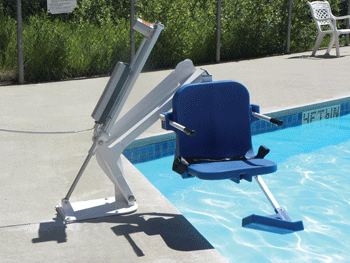 In the heated debate over the new ADA pool lift requirements the hospitality industry, which is the industry most affected, has argued that tort liability for misuse of the lifts is an important objection to their installation. Safety is important, of course, but this may be one case where liability is not a problem because ADA requirements preempt state law tort claims. The existing regulations requiring fixed lifts may reduce the risk of liability rather than increasing it.
In the heated debate over the new ADA pool lift requirements the hospitality industry, which is the industry most affected, has argued that tort liability for misuse of the lifts is an important objection to their installation. Safety is important, of course, but this may be one case where liability is not a problem because ADA requirements preempt state law tort claims. The existing regulations requiring fixed lifts may reduce the risk of liability rather than increasing it.
Federal preemption of state law claims has complexities enough to satisfy any law professor, but the Supreme Court has set out one very clear rule: “A holding of federal exclusion of state law is inescapable and requires no inquiry into congressional design where compliance with both federal and state regulations is a physical impossibility” Florida Lime and Avocado Growers v Paul. This rule seems to apply directly to tort claims arising out of misused pool lifts. The 2010 Accessibility Standards give hotels and other pool operators no choice about the installation of pool lifts for new construction and renovations. Older pools must have lifts installed only if this is “readily achievable,” but the price of pool lifts seems to fall well within the range of costs that courts routinely find reasonable. Pool lift manufacturers offer models they say can be installed almost anywhere, so location is also no objection. From a purely economic standpoint the cost of installing a lift is far below the cost of defending even one ADA lawsuit over what was “readily achievable.”
Under Florida Lime and subsequent cases, if a government regulation requires that a pool lift be provided then common law claims for negligence and nuisance should be preempted, at least to the extent they rest on the existence and location of the pool lift. This is one of those rare cases in which it will be impossible to both comply with federal regulations and eliminate a dangerous condition, for the presence of the required lift is the dangerous condition.
The possibility of preemption suggests that opposition to the existing DOJ regulations will increase liability. The industry supports legislation that would eliminate the requirement of fixed lifts, and require that portable lifts be available only on request. If fixed lifts are required preemption would seem to bar common law claims based on their presence. When a portable lift is left on the pool deck after pool hours the hotel management has made a choice that was not compelled by any federal regulation. Thus, if someone misuses the lift and is injured there is a very good chance of a lawsuit, and no preemption defense. A rule that requires that the lift be brought out only on request has a similar effect. If management has the choice of putting the lift away when it is not in use then leaving it out during the hours the pool is open represents a possibly negligent choice. Because industry has insisted that this is a safety issue, it may be hard to claim that failing to put away a portable lift was not negligent.
As I said, federal preemption is often a tricky business. In this case though the present regulations may serve to insulate from rather than expose pool operators to liability for injuries caused by pool lifts.

